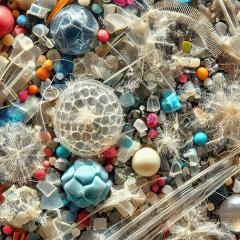Metagenome mining for environmental microbiome surveillance and contaminant interactions
Metagenome mining for environmental microbiome surveillance and contaminant interactions - Dr. Joeselle Serrana
The Baltic Sea, a semi-enclosed brackish water body with strong environmental gradients and anthropogenic pressures, offers a unique model system for studying microbial responses to pollution. This talk highlights the use of metagenomics to uncover the diversity and functional potential of native microbial communities in this brackish environment. By mining the genetic potential from environmental microomes, we aim to understand how microbes are involved in the degradation of pollutants like petroleum hydrocarbons and contribute to the antimicrobial resistance dynamics in aquatic systems. These insights are crucial for predicting ecosystem resilience, informing pollution mitigation efforts, and informing future environmental surveillance strategies.
I am a molecular ecologist investigating how ecological processes and environmental stressors influence aquatic biodiversity and microbiome function. By integrating ecological, molecular, and bioinformatics approaches, I aim to uncover the mechanisms driving biological dynamics and community interactions across genes, species, and ecosystems in both natural and engineered aquatic environments. Born and raised in the Philippines, I earned my Ph.D. in Civil and Environmental Engineering at Ehime University (Japan, 2021), with my doctoral work focused on developing and applying ecological indicators for biodiversity and biomonitoring of freshwater ecosystems undergoing habitat restoration across Japan, the USA, and Switzerland. I then trained in microbiome multi-omics, meta-bioinformatics, and high-throughput functional assays under the NSERC-TECHNOMISE program at the University of Ottawa (Canada, 2021-23). Currently, I am a postdoc at the Posselt Group in the Contaminant Chemistry Unit of ACES, with support from the Stockholm University Center for Circular and Sustainable Systems (SUCCeSS). Here, my research focuses on microbial community dynamics and biodegradation mechanisms in aquatic environments. I am particularly interested in refining standard biodegradation testing methods to enhance their environmental relevance and contribute to interdisciplinary approaches for improving ecosystem health.

